‘An inspiration to all of us’: Professor Stephen Hawking dies aged 76
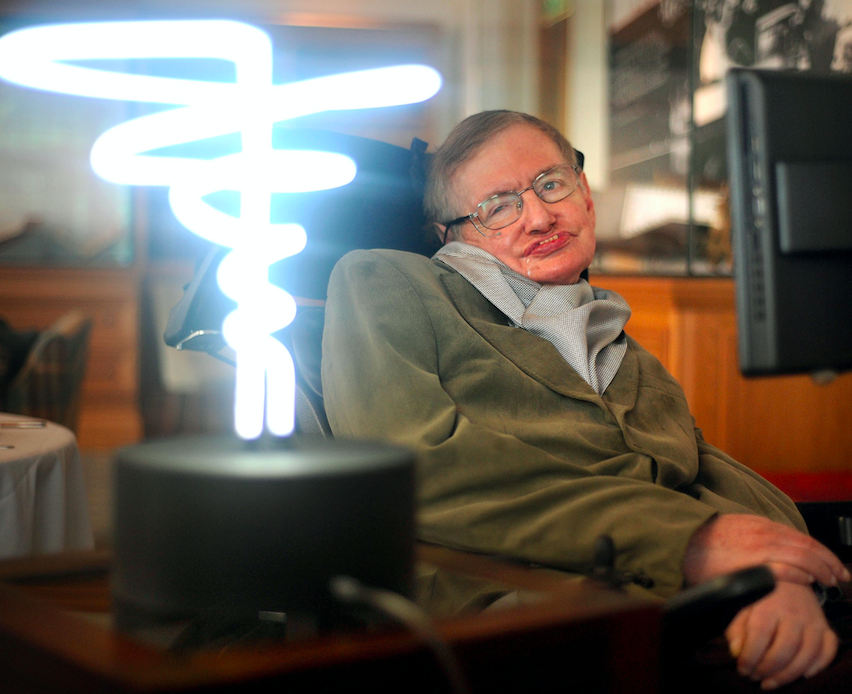
Tributes have poured in for renowned British physicist Professor Stephen Hawking, who has died at the age of 76.
Prof Hawking died peacefully at his home in Cambridge in the early hours of Wednesday morning, a family spokesman said.
In a statement, his children Lucy, Robert and Tim said: ‘We are deeply saddened that our beloved father passed away today.
‘He was a great scientist and an extraordinary man whose work and legacy will live on for many years.
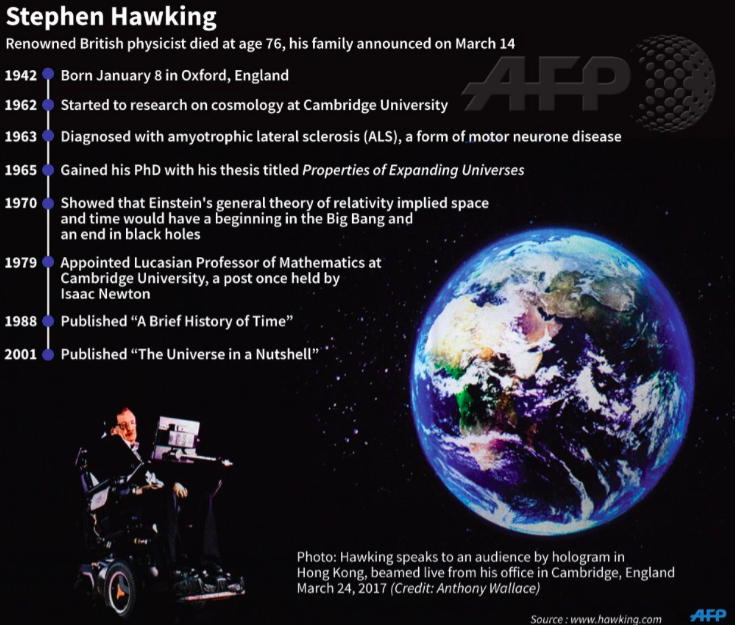
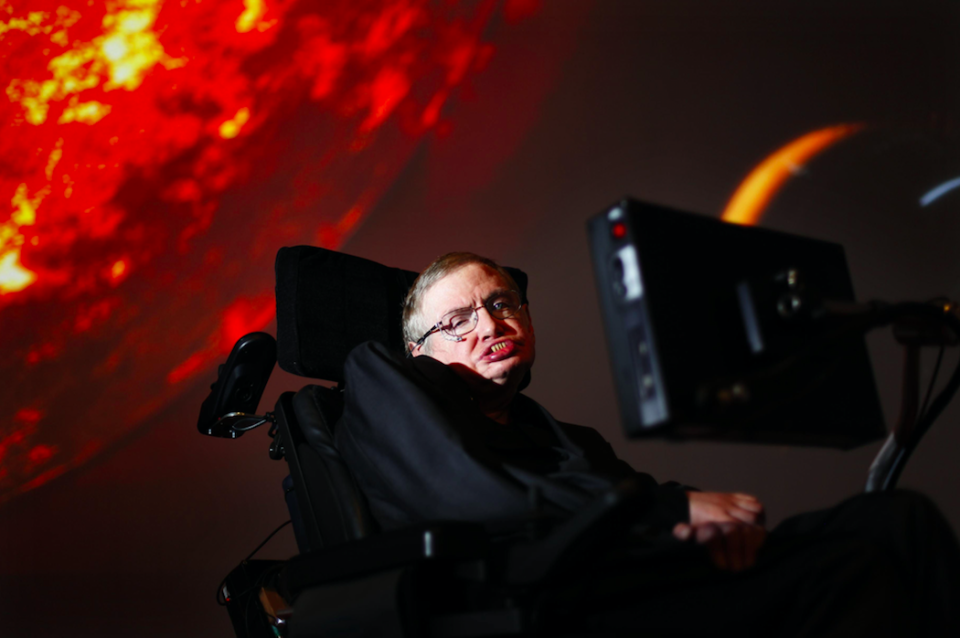
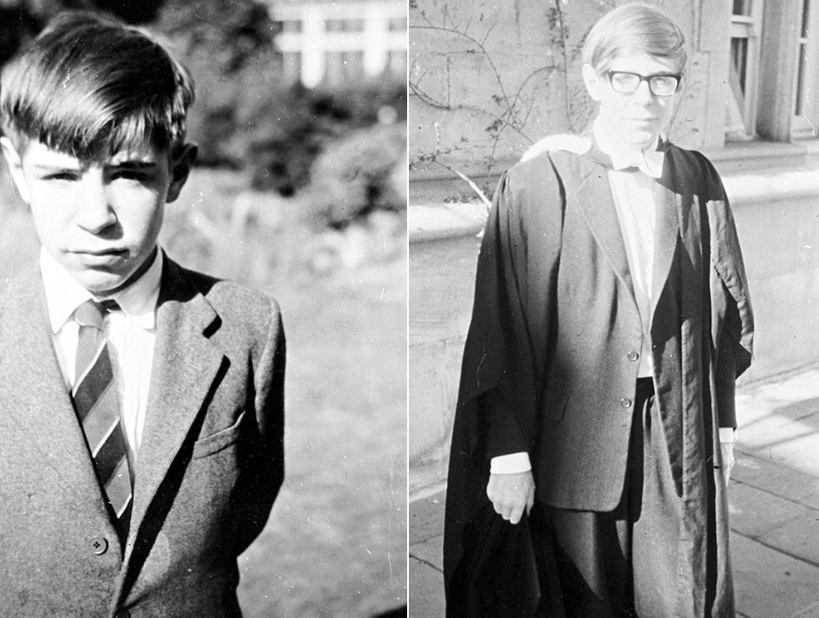
‘His courage and persistence with his brilliance and humour inspired people across the world. He once said, ‘It would not be much of a universe if it wasn’t home to the people you love.’ We will miss him forever.’
Tributes to a great mind
Astrophysicist Neil deGrasse Tyson was one of the first to pay tribute to one of the world’s finest scientific minds.
Sharing a photo of himself and Prof Hawking on Twitter, he said: ‘His passing has left an intellectual vacuum in his wake. But it’s not empty. Think of it as a kind of vacuum energy permeating the fabric of spacetime that defies measure. Stephen Hawking, RIP 1942-2018.’
His passing has left an intellectual vacuum in his wake. But it’s not empty. Think of it as a kind of vacuum energy permeating the fabric of spacetime that defies measure. Stephen Hawking, RIP 1942-2018. pic.twitter.com/nAanMySqkt
— Neil deGrasse Tyson (@neiltyson) March 14, 2018
Remembering Stephen Hawking, a renowned physicist and ambassador of science. His theories unlocked a universe of possibilities that we & the world are exploring. May you keep flying like superman in microgravity, as you said to astronauts on @Space_Station in 2014 pic.twitter.com/FeR4fd2zZ5
— NASA (@NASA) March 14, 2018
Genius is so fine and rare. Goodbye Professor Hawking. You inspired and taught us all. pic.twitter.com/9Drdnv2eEe
— Chris Hadfield (@Cmdr_Hadfield) March 14, 2018
Space agency NASA wrote: ‘His theories unlocked a universe of possibilities that we & the world are exploring. May you keep flying like superman in microgravity.’
Prof Hawking was diagnosed with early-onset ALS, a rare form of motor neurone disease, eventually becoming wheelchair-bound and dependent on a computerised voice system for communication.
Diagnosed at the age of 21, Hawking was warned he was unlikely to live for more than two years. He lasted for more than 50.
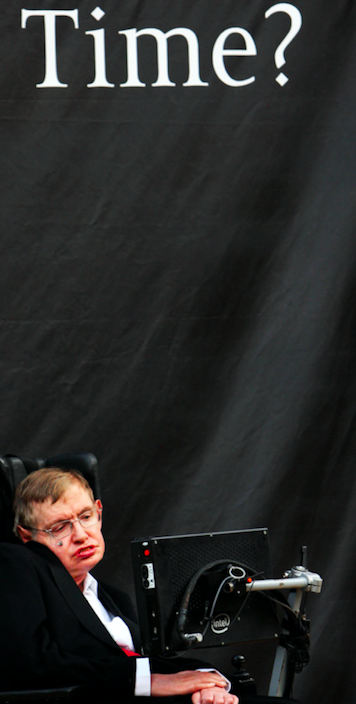
But despite this, he continued to travel the world giving science lectures and writing scientific papers about the basic laws which govern the universe.
His book, A Brief History Of Time, has sold more than 10 million copies.
The University of Cambridge, where Prof Hawking rose through the ranks to become the Lucasian Professor of Mathematics, described him as ‘an inspiration to millions’.
MOST POPULAR TODAY ON YAHOO
‘Don’t threaten us’: Russia’s extraordinary nuclear warning to May
Watch: Shocking moment gang member grabs pen and attacks witness in court before being shot dead
Biracial twins’ mum reveals what it’s like for them growing up one black, one white
The university’s vice-chancellor Professor Stephen Toope said: ‘Professor Hawking was a unique individual who will be remembered with warmth and affection not only in Cambridge but all over the world.
‘His exceptional contributions to scientific knowledge and the popularisation of science and mathematics have left an indelible legacy.
‘His character was an inspiration to millions. He will be much missed.’
Cultural impact
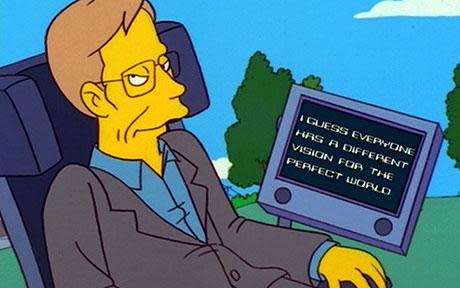
He was an intellectual giant, but Professor Hawking also embraced popular culture.
The celebrated physicist featured in cartoon The Simpsons and enjoyed a cameo in several episodes of The Big Bang Theory, the hit US sitcom about a group of science geeks.
He was so proud of his appearance in The Simpsons, which he called “the best thing on American television”, that he had a clock depicting Homer on a wall in his office
In loving memory of Stephen Hawking. It was an honor to have him on The #BigBangTheory. Thank you for inspiring us and the world. pic.twitter.com/9rWoYqIToy
— The Big Bang Theory (@bigbangtheory) March 14, 2018
This photo of Stephen Hawking in zero gravity brings me immense joy. #RIP pic.twitter.com/0r3wZfKc5L
— Meredith Frost (@MeredithFrost) March 14, 2018
The Twitter page for US TV show The Big Bang Theory tweeted a picture of the cast with Prof Hawking, who starred as himself in several episodes of the sitcom.
The tweet said: ‘In loving memory of Stephen Hawking. It was an honour to have him on The #BigBangTheory. Thank you for inspiring us and the world.’
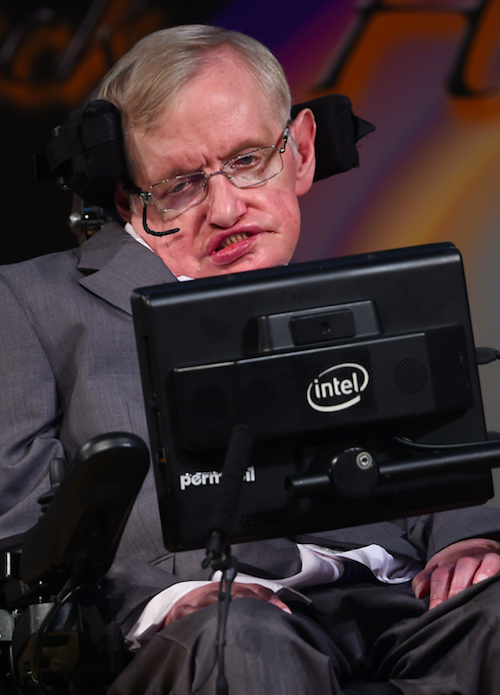
Complex personal life
Professor Hawking may have been one of the world’s most eminent scientists but one thing remained a mystery to him by his own admission – women.
The physicist symbolised the upper reaches of the power of the human mind.
But once when asked what he thinks most about during the day, he said: ‘Women. They are a complete mystery.’
Hawking met his future wife, Jane Wilde, in 1963 shortly before being diagnosed with MND. The two married and had thee children – Robert, Lucy and Timothy.
Ms Wilde has previously described how she felt the family was ‘left behind’ following the publication of her husband’s seminal work ‘A Brief History of Time’.
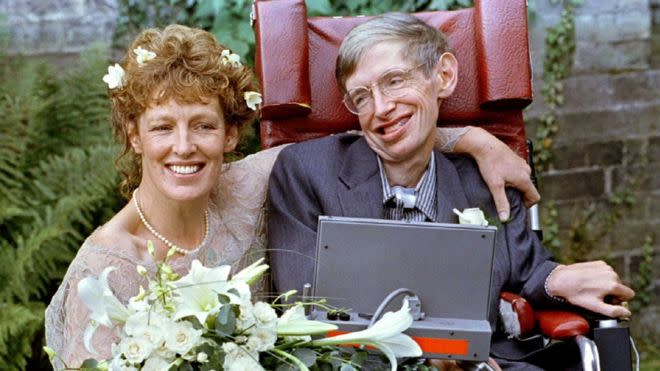
In 1990, Hawking began a relationship with his nurse, Elaine Mason. They married five years later but that relationship was also beset by tensions with this children, who didn’t get on with their stepmother.
Hawking’s wife was even accused of physically abusing him, something the professor himself denied.
The two eventually divorced in 2006, which led, in later years, to a reconciliation between Professor Hawking and his first wife.
Nobel prize eluded him
Professor Stephen Hawking’s groundbreaking work earned him dozens of accolades over his lifetime, but the coveted Nobel Prize always eluded him.
His discovery in 1974 that black holes should emit radiation was initially controversial as it was widely accepted that nothing, not even light, could escape their gravity.
His theory, dubbed “Hawking Radiation”, was based on mathematical concepts arising from quantum mechanics, the branch of science dealing with sub-atomic particles. It stated that this emission of radiation eventually causes black holes to “evaporate” and vanish.
Although it became widely accepted, Hawking Radiation was never proved by astronomers or physicists – if it had, it would almost certainly have earned him the Nobel Prize.
In January 2016, Prof Hawking gave a Reith Lecture broadcast on the BBC in which he joked that his lack of a Nobel Prize was “a pity”.
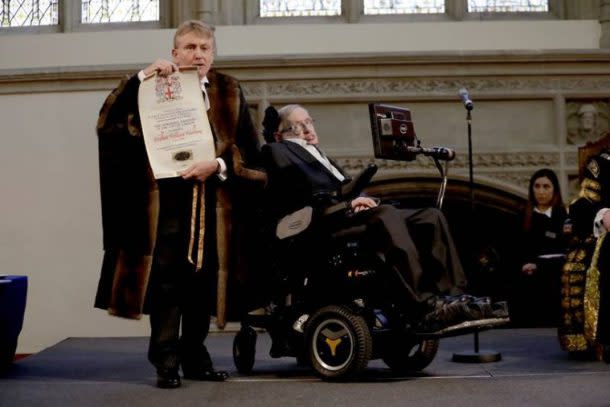
He said: “A mountain-sized black hole would give off X-rays and gamma rays, at a rate of about 10 million megawatts, enough to power the world’s electricity supply.
“It wouldn’t be easy however, to harness a mini black hole – about the only way to keep hold of it would be to have it in orbit around the Earth.
“People have searched for mini black holes of this mass, but have so far not found any. This is a pity because if they had I would have got a Nobel Prize.”
‘Transformed the universe’
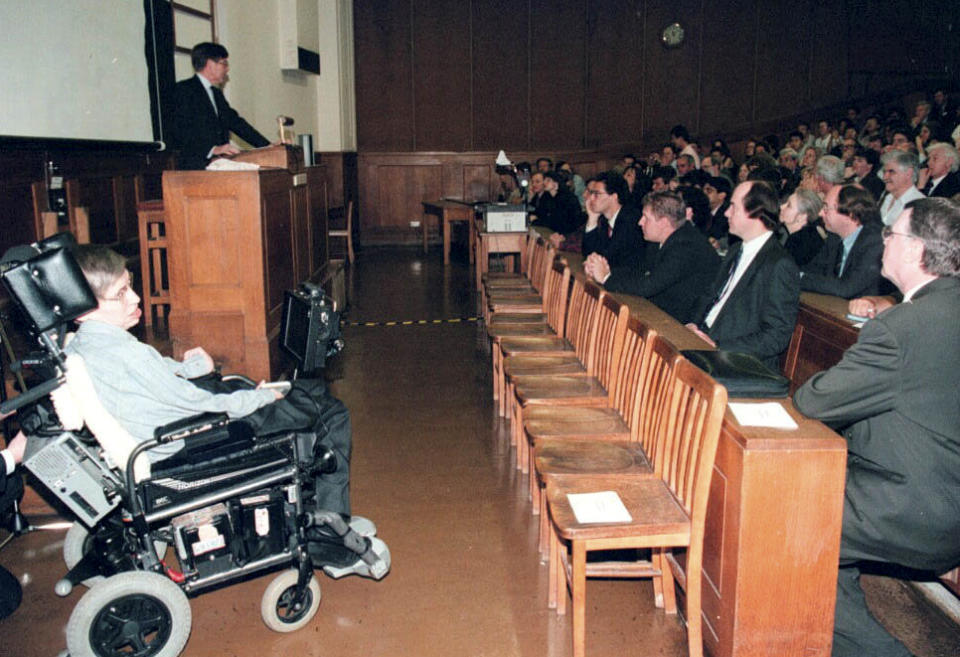
Professor Sir Leszek Borysiewicz, a former vice-chancellor of the University of Cambridge, said he was “proud” that the “world’s best-known scientist” was a Cambridge colleague.
“It would always be appropriate for Cambridge to celebrate such a person, and in Stephen’s case there is even more reason to mark a long life that has transformed our perception of the universe,” he added.
The inventor of the World Wide Web, Sir Tim Berners-Lee, tweeted: ‘We have lost a colossal mind and a wonderful spirit. Rest in peace, Stephen Hawking.’
British astronaut Tim Peake said Prof Hawking ‘inspired generations to look beyond our own blue planet and expand our understanding of the universe.
‘His personality and genius will be sorely missed. My thoughts are with his family,’ he wrote on Twitter.
He inspired generations to look beyond our own blue planet and expand our understanding of the universe. His personality and genius will be sorely missed. My thoughts are with his family.
BBC News – Stephen Hawking dies aged 76 https://t.co/YOuoA6rfzP
— Tim Peake (@astro_timpeake) March 14, 2018
Sad to hear about Stephen Hawking. What a remarkable life. His contributions to science will be used as long as there are scientists, and there are many more scientists because of him. He spoke about the value and fragility of human life and civilisation and greatly enhanced both
— Brian Cox (@ProfBrianCox) March 14, 2018
Physicist James Hartle, whose work with Prof Hawking led to the Hartle-Hawking model of the universe’s origins, said his colleague had ‘inspired a lot of people’.
Prof Hartle told BBC Radio 4’s Today: ‘What was unique about him was that he had a marvellous ability to see through all the clutter in physics and to see what the essential points are and that, of course, was a great thing for going forward.’
He added: ‘My memory of him would be on several fronts: first our work together, as a scientist, and second as a human being whose whole story is of triumph over adversity and who inspired a lot of people, including me.’
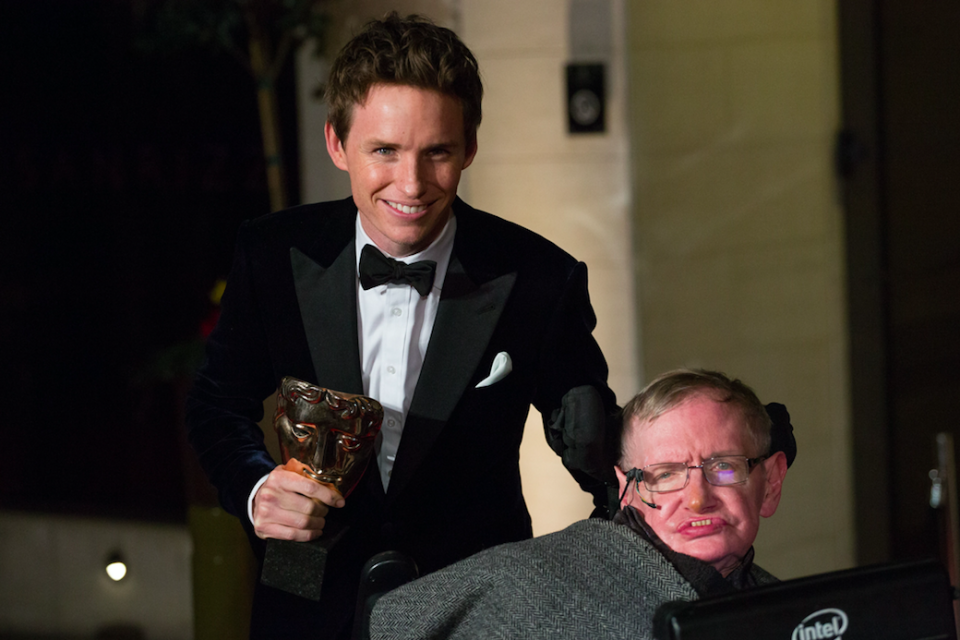
Scientist and broadcaster Professor Brian Cox tweeted: ‘Sad to hear about Stephen Hawking. What a remarkable life.
‘His contributions to science will be used as long as there are scientists, and there are many more scientists because of him. He spoke about the value and fragility of human life and civilisation and greatly enhanced both.’
Eddie Redmayne, who won an Oscar for playing Prof Hawking in The Theory Of Everything, said in a statement: ‘We have lost a truly beautiful mind, an astonishing scientist and the funniest man I have ever had the pleasure to meet.
‘My love and thoughts are with his extraordinary family.’

 Yahoo News
Yahoo News 

